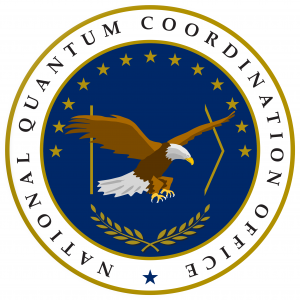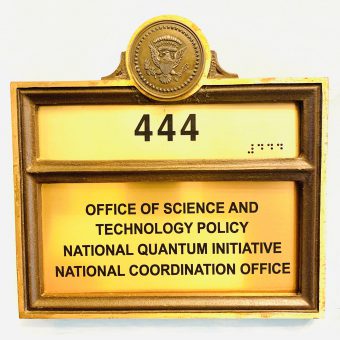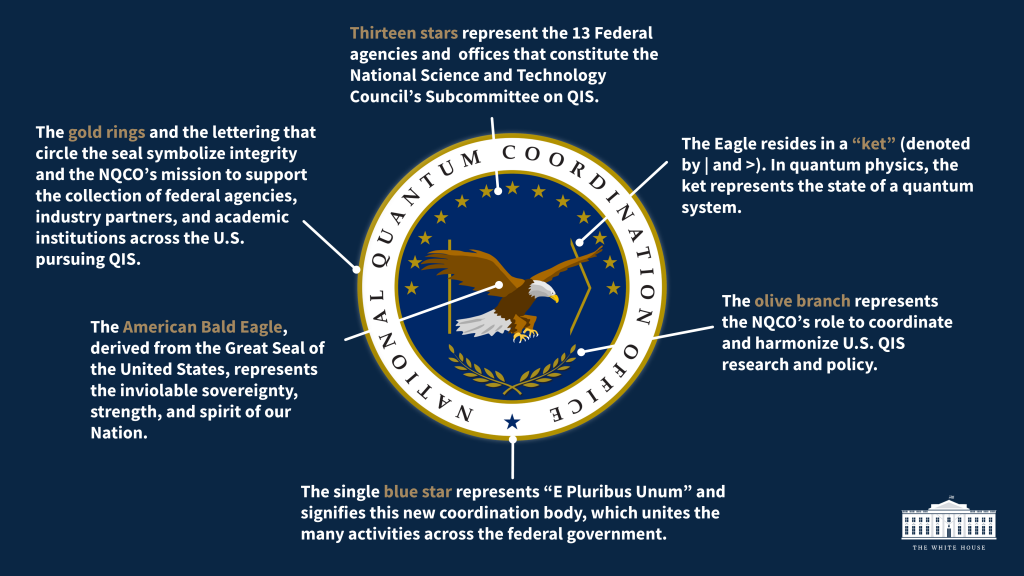THE NATIONAL QUANTUM COORDINATION OFFICE

Located in the White House Office of Science and Technology Policy (OSTP), the National Quantum Coordination Office (NQCO) carries out the daily activities needed for coordinating and supporting the National Quantum Initiative (NQI). The NQCO was established to:
- provide technical and administrative support to the National Science and Technology Council Subcommittees on Quantum Information Science (SCQIS) and the Economic and Security Implications of Quantum Science (ESIX), and the National Quantum Initiative NQI Advisory Committee;
- oversee interagency coordination of the NQI Program;
- serve as a central point of contact regarding Federal civilian quantum information science and technology activities;
- ensure coordination among the consortia and various quantum centers;
- conduct public outreach, including dissemination of findings and recommendations of the NQI Advisory Committee, as appropriate;
- and promote access to and early application of the technologies, innovations, and expertise derived from NQI Program activities in pursuit of discoveries and new applications invoking quantum systems.
The NQCO staff are federal employees on detail assignments from across the government. NQCO staff serve as co-chairs of the various interagency working groups established by the SCQIS and ESIX.
NQCO STAFF

Dr. Gretchen Campbell
Assistant Director for QIS at OSTP, and Director of the NQCO
Dr. Gretchen Campbell is the Assistant Director for Quantum Information Science (QIS) and the Director of the National Quantum Coordination Office (NQCO) within the White House Office of Science and Technology Policy. The NQCO ensures coordination of the National Quantum Initiative and QIS activities across the federal government, industry, and academia.
Dr. Campbell is on detail from the National Institute of Standards and Technology (NIST), where she is the co-director of the Joint Quantum Institute, a joint institute between the University of Maryland and NIST, and the Group Leader for the Laser Cooling and Trapping group in the Quantum Measurement Division at NIST. She is also an Adjunct Professor in the Department of Physics at the University of Maryland. Dr. Campbell received a B.A. in Physics from Wellesley College in 2001 and received her Ph.D. from MIT in 2007. From 2007-2009, she was a NRC postdoctoral fellow at JILA and NIST in Boulder, Colorado. Dr. Campbell’s research has included a wide range of experimental work in the field of ultracold atomic gases. She is a fellow of the American Physical Society. Her awards include the Arthur Flemming Award (2012); the Presidential Early Career Award in Science and Engineering (2012); the Sigma Xi Katherine Blodgett Gebbie Young Scientist Award (2013); the APS Maria Goeppert Mayer Award (2015), and the IUPAP C15 Young Scientist Prize (2015). She was also a Finalist for the Samuel J. Heyman Service to America Medals, Call to Service category (2015).
Dr. Brad Blakestad
Deputy Director of the NQCO
Dr. Brad Blakestad is the Deputy Director of the National Quantum Coordination Office within the White House Office of Science and Technology Policy. He is on detail from the Laboratory for Physical Sciences, where he has advanced the understanding of quantum technologies as a Technical Lead and Program Manager for extramural research projects since 2013. In this role, he stood up multiple research programs in quantum information science with academia, industry, and national labs. From 2016-2020, he was detailed to the Intelligence Advanced Research Projects Activity, where he oversaw two large research programs on quantum information systems that made major advances in the understanding of quantum error correction and quantum annealing. He was the Executive Secretary and then Co-Chair for the National Science Technology Council’s Subcommittee on the Economic and Security Implications on Quantum Science (ESIX), where he has helped shape national quantum policy across the U.S. Government.
Dr. Blakestad earned a PhD in Physics at the University of Colorado – Boulder and a B.Sc. in Physics with Honors from the California Institute of Technology. From 2010-2011 he was a Joint Quantum Institute Postdoctoral Research Fellow at the University of Maryland and the National Institute of Standards and Technology. His career contributions have been recognized by the Presidential Early Career Award for Scientists and Engineers.
Dr. Hilary Hurst
Quantum Liaison for the NQCO
Dr. Hilary Hurst is the Quantum Liaison for the National Quantum Coordination Office at the White House Office of Science and Technology Policy, where she coordinates workforce development, international cooperation, and outreach efforts in support of the National Quantum Initiative. Dr. Hurst is on detail from the Department of Energy, where she serves as a program manager in the Office of Science, Basic Energy Sciences program supporting research in quantum information science and atomic, molecular, and optical sciences.
Dr. Hurst has a B.S. degree in Engineering Physics from the Colorado School of Mines with a minor in Public Affairs. She received a Master’s in Theoretical Physics and Applied Mathematics from the University of Cambridge and a Ph.D. in Physics from the University of Maryland. From 2018-2020 she was a National Research Council postdoctoral fellow at NIST in Gaithersburg, Maryland. Dr. Hurst is on loan from San José State University, where she has been an Assistant Professor in the Physics & Astronomy Department since 2020.
CONTACT US
Please use the form below to connect with the NQCO on policy issues related to the National Quantum Initiative. The multiple choice categories are centered on the main policy areas of the NQI and help us insure that your comments are directed to the correct person.
ABOUT THE NQCO SEAL
The National Quantum Initiative Act of 2018 launched the National Quantum Coordination Office (NQCO) to lead the coordination of the Federal government’s exploration of quantum information science (QIS) through the National Quantum Initiative and America’s QIS activities. Each aspect of the NQCO seal is representative of key drivers of this initiative and the office’s mission:

As a whole, the NQCO seal symbolizes the office’s commitment to promote scientific advancement in the Federal government and the private sector and to drive American leadership in QIS.
LETTERS FROM THE FIRST NQCO DIRECTOR
Perspectives from the first Director of the NQCO on progress coordinating the National Quantum Initiative from across US QIS R&D activities.
- March 1, 2024: Never a Bad Time, highlighting the LPS Qubit Collaboratory
- February 29, 2024: Quantum Origin Stories, highlighting the National Q-12 Education Partnership
- August 3, 2023: Cheek by Jowl, highlighting the Fermilab-led Superconducting Quantum Materials and Systems Center
- June 1, 2023: Why Quantum Matters to You, highlighting the Air Force Research Lab in Rome, NY
- April 13, 2023: A Pivotal Year for National Quantum Policy, reflecting on significant achievements in quantum policy in the past year
- May 3, 2022: Quantum Industry and Society, highlighting the Quantum Economic Development Consortium (QED-C)
- February 1, 2022: A Quantum Wish, a letter to the community on quantum outreach and community engagement
- April 6, 2021: The State of Quantum, highlighting the Center for Quantum Networks
- December 3, 2020: The Quantum Questions, highlighting the Q-SEnSE Quantum Leap Challenge Institute
- October 20, 2020: Strengthening U.S. Leadership in Quantum Information Science, highlighting Argonne’s Q-NEXT QIS Research Center

